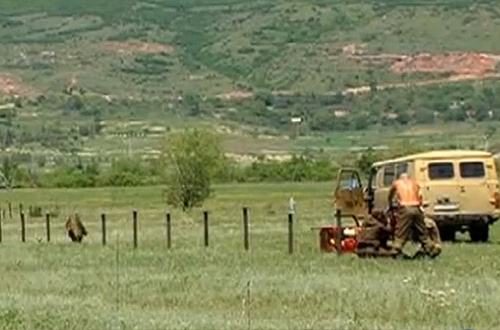
Tensions on the Border Between Georgia and South Ossetia
Publication: Eurasia Daily Monitor Volume: 10 Issue: 104
By:

For the past several days, Georgian politicians and experts have extensively discussed the alarming development of the situation around the village of Ditsi (https://en.ria.ru/world/20130527/181373355.html), located at the border between Georgia and South Ossetia. The government in Tbilisi considers this boundary “administrative” and is invariably sensitive to any changes in it, especially, when they concern the lives of the few people that have remained in the border zone since the Russian-Georgian conflict of August 2008. In Moscow and Tskhinvali, this border is regarded as a “state” boundary. This fundamental disagreement causes periodic escalations of tensions in the area.
On May 27, engineering units of the border agency of South Ossetia under the protection of the Russian border guards unilaterally started to demarcate the border in close vicinity to the village of Ditsi. Barbed wire was installed along the border using GPS technology and Soviet-era maps that specified the borders between Gori and Karel districts of Georgia proper and the South Ossetian autonomous region (https://www.civil.ge/eng/article.php?id=26117). In some areas, the barbed wire was installed across pastures and arable lands that residents of Ditsi have traditionally used. Sources of drinking water and the village’s cemetery were also separated from Ditsi by the newly installed border (https://www.kommersant.ru/doc/2199457). The border’s demarcation, therefore, led to profound changes in the lifestyle of the villagers, who demanded that Georgian authorities address the situation.
Members of the ruling Georgian Dream coalition and of the presidential party, United National Movement (UNM), both arrived in Ditsi and expressed their indignation at the demarcation, including villagers’ accounts that the border had been moved 300 meters deeper into Georgia (https://www.kommersant.ru/doc/2199457). The Ossetian side strongly denied these statements, saying that the border was installed in strict accordance with the maps and GPS data on the South Ossetian territory (https://osradio.ru/politika/60882-khokh-gaglojjty-upominanija-rossii-v-dejjstvijakh.html). Judging by the statements coming from Moscow and Tskhinvali, the demarcation work was being carried out in accordance with the 2009 agreement between Russia and South Ossetia that assigned the protection and also the demarcation of the breakaway region’s border to Russian border guards (https://frontnews.ge/index.php?action=news_read&npid=20747&lang=eng).
But why would Moscow and Tskhinvali seek to disturb the status-quo and escalate tensions with Tbilisi? The timing is strange because it comes while the Georgian government under Prime Minister Bidzina Ivanishvili has not only been abstaining from taking any aggressive steps, but is also trying to start a dialogue with Moscow and to soften the tensions between the two countries. “What is happening is very unpleasant and, speaking frankly, puzzling, because I thought that the new [Georgian] authorities and Russia would have a different kind of relationship,” Ivanishvili said on May 29 (https://www.rosbalt.ru/exussr/2013/05/29/1134842.html). The head of government commented on the tense situation only after it became known that Russian border guards arrested a 24-year-old resident of Ditsi, charging him with crossing the border illegally (https://frontnews.ge/index.php?action=news_read&npid=20668&lang=eng).
Members of the parliamentary opposition stated that the prime minister’s policy of improving relations with Russia has failed. “Ivanishvili has tried to strike an agreement with Moscow using concessions and avoiding any steps that could irritate Russia, but [Vladimir] Putin’s aim is creeping annexation of all Georgian territory to turn our country into a foothold of Russia’s influence in the Caucasus and the Middle East,” UNM member of parliament (MP) Shota Malashkhia told Jamestown. Independent observers also agree with such views: “Russia demonstrates that it does not regard the Georgian government’s rhetoric as something important. Russia has its own objectives and it acts without considering the reaction of Tbilisi or of the West,” analyst George Nodia said in an interview with Jamestown.
“The main problem is that Moscow is not satisfied with the symbolic concessions from Prime Minister Ivanishvili, such as the rejection of the boycott of the [2014 Winter] Olympics in Sochi,” Global News agency expert David Avalishvili told Jamestown. Rather, he argued, “Russia wants something far greater—Tbilisi is expected to spurn its course for NATO [North Atlantic Treaty Organization] membership and to adopt the course of becoming closer to Putin’s Eurasian Union.” According to Avalishvili, “In a situation when the West is much more worried about the developments around Syria and Iran, Moscow received a ‘window of opportunity’ to speed up the integration of the post-Soviet space.”
It was noticeable that the reaction of the West to the events at the border was much milder than the Georgian authorities would have liked. Washington and Brussels limited their reaction by expressing their “concern” and reiterated their support for the territorial integrity of Georgia (https://ria.ru/world/20130531/940459910.html#13699703839373&message=resize&relto=register&action=addClass&value=registration). Russian border guards, however, carried on their work, installing barbed wire and thereby demonstrating Moscow’s complete indifference to the Western reaction and to Tbilisi’s indignation (https://frontnews.ge/index.php?action=news_read&npid=20636&lang=eng). Direct talks with the Russian side are the only hope Ivanishvili’s government has at the moment. On June 4 or June 5, the Deputy Minister of Foreign Affairs of Russia Grigory Karasin is again scheduled to meet Special Representative of the Prime Minister of Georgia Zurab Abashidze in Prague. Abashidze told Jamestown that Georgian and Russian diplomats do not formally discuss Abkhazia and South Ossetia—especially the situation on the border—within the framework of the Prague Meetings. “For discussions on security issues, there is the Geneva Framework of international meetings on the security in the South Caucasus,” the diplomat emphasized. Yet, Abashidze expressed his hope that the “problem of Ditsi” will be touched upon and that Moscow will indicate a level of good will regarding the humanitarian situation around the village.
The events in Ditsi became an important signal for the Georgian government, illuminating Moscow’s utter disregard for Ivanishvili’s “symbolic gestures”; Russia wants much more from Georgia, a country that is strategically situated at the frontier between Europe and Asia. Sooner or later, Russia will achieve what it wants, unless the West finally makes it clear where its “red lines” in the post-Soviet space lie. Currently, while Western partners overlook Georgia’s problems, the country’s population suffers from a profound sense of insecurity. Until this state of affairs of addressed, the vacuum will continue to be filled with pro-Russian politicians such as former speaker of the parliament Nino Burjanadze, who advocates the rejection of a pro-Western course for Georgia (https://www.apsny.ge/2013/pol/1369969311.php).




